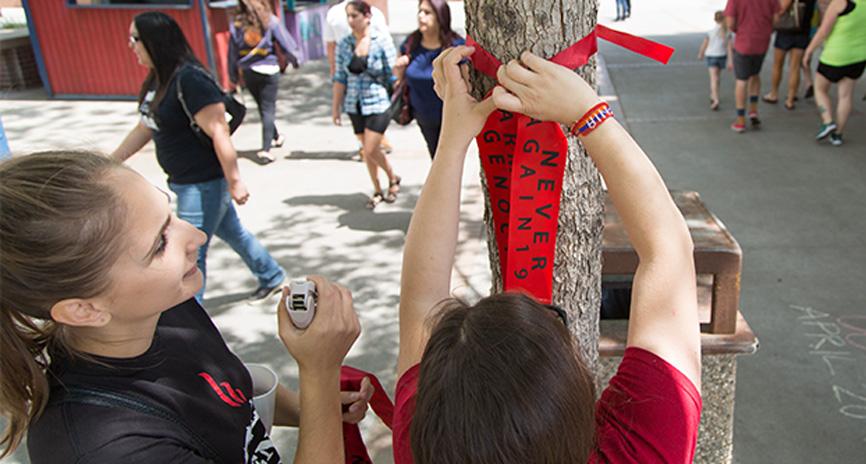One-hundred years later, the first genocide of the 21st century remains a piercing anchor in the lives of younger-generation Armenians, impacting their values, beliefs and decisions.
Armenian music, family and history are the three things that keep Ovsanna Simonyan close to her culture.
“Music keeps my spirit alive. Family values have created such a close tie with all my relatives, and the history, of course, is a constant reminder of why I am still alive today,” said Simonyan, a senior business administration student at Fresno State.
One of the first things Simonyan learned as a child was her lineage — two generations of grandparents from her father’s side who were survivors of the Armenian Genocide.
Her great-great grandfather, Harutyun Simonyan, lived in the village of Moosh, where he witnessed the assassinations of his family, friends and 22-year-old mother at age four. He and others escaped to eastern Armenia and migrated to Lernakert where many survivors from Moosh resided, Simonyan said.
Later, Harutyun Simonyan’s son, David Simonyan, a devoted religious man, also crossed paths with Turkish soldiers.
“About two years before the Turks invaded Lernakert, he had a dream where an angel told him, ‘Very soon there will be mass deaths, but I will save you and your generation,’” Simonyan said.
It started in the spring of 1918, Simonyan said, when a Turkish general entered the village with a few soldiers. Her great-grandfather David was asked to speak with the general, because he was the only Turkish-speaking man in the village. He, along with the elders of the city, gathered around the soldiers imploring them not to resort to violence.
“The general said, ‘Look, I have come by myself. There is nothing to be afraid of. We have just come and will continue on our path without any violence,’” Simonyan explained. “Little did they know that the Turkish army had already surrounded the village, closing off all possible escape routes.”
As the soldiers and generals left, one soldier stayed behind to get water, Simonyan said, and David confronted him.
The soldier said, “If you can, run, because once we leave, soldiers will enter and kill.’”
David warned the village of what he was told, but many did not believe him. He then gathered his family and their valued possessions, along with a few guns, and left on foot. As they were crossing a river to escape the annihilation, the Turkish soldiers appeared and tried to cross over the river to attack.
“The younger boys loaded the gun powder as the elders shot, killing two soldiers and injuring others,” Simonyan said.
Back in Lernakert, the Turks entered. Hundreds of boys and men being whipped, beaten and chained were herded into a storage building and burned alive, Simonyan said. Some of the women were reportedly tortured, raped, killed and thrown naked into the mud.
“I believe my duty is to make sure the world knows and recognizes the atrocities of the Ottoman Empire,” Simonyan said.
Simonyan is one of many students at Fresno State with direct family lineage traced back to the Armenian Genocide.
Tatevik Hovhannisyan’s grandfather was also a survivor, and said her direct connection to the event has made the mission of awareness and acceptance of the genocide a personal cause.
“I always imagine what my grandpa would want me to do,” said Hovhannisyan, a commercial recreation and special event planning major.
Starting at the age of five, Hovhannisyan’s mother educated her about their homeland, culture and history, which has helped shape her beliefs, educational path and religion, she said.
Marine Vardanyan, a community health major, knew she couldn’t miss out on the opportunity to learn more about herself and her background and declared a minor in Armenian studies.
“They’ve equipped me with the tools to inspire younger generations of Armenians and to help keep the Armenian culture alive in our Fresno community,” said Vardanyan, president of the Armenian Students Organization. “I plan on using all that I have learned to educate my peers, both Armenian and non-Armenian, and to demonstrate my pride in being Armenian.”
Her goal, like that of many others, is to keep her culture alive and strive for the recognition of the genocide for the knowledge of future generations.




